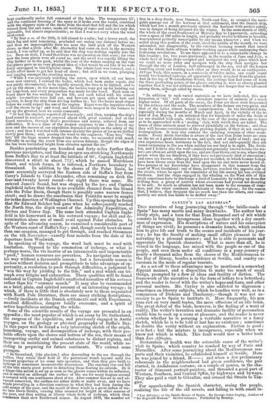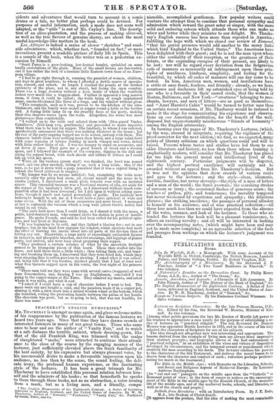CkIrLBY'S LAS ALFORJAS. I
Tins narrative of long journeying through " the bridle-roads Spain" has many merits and many drawbacks. The author has a lively style, and a turn for that Bean Brummel sort of wit whieli
consists in bringing incongruous ideas together with a dry smart- ness of expression. His descriptions of nature and his conception. of things are vivid ; he possesses a dramatic knack, which enables him to give life and truth to the scenes and incidents of his jour- ney ; he has the faculty of making small affairs pleasant in the narrating by a pleasant manner ; and he is able to personate and appreciate the Spanish character. What is more than all, he is versed in the language, has mixed with the .people as one of the people, and seen them under all conditions in a pony-journey of nearly a thousand miles from the shores of the Mediterranean to the Bay of Biscay, besides a residence at Seville, and sundry ex- cursions in the mode of regular tourists. As a set-off to these advantages may be mentioned a somewhat flippant manner, and a disposition to make too much of small things, prompted by a flow of ideas and facility of diction. The framework of the narrative is in the form of letters to a betrothed; and the reader is bored with the writer's hopes and fears, and other personal matters. Mr. Cayley is also addicted to digression ; sometimes on literary subjects, which he handles very well, as in a comparison of Dickens and Thackeray,—though it was not ne- cessary to go to Spain to institute it. More frequently, his pen runs riot on very small topics, the mere effusions of an idle brain. The great defect of the book, however, is the feeling of a want of reality. The writer's invention and dramatic facility of personation enable him to cook up a scene at pleasure, and the reader is never certain whether he is perusing a veritable narrative or a fancy sketch, which he is to be told at last has no existence ; sometimes he doubts the verity without an explanation. Fiction is good ; so is fact ; but the mixture is incongruous, especially when we know not which is which. This fault would mar a better book than Las Alfmjas. Restoration of health was the ostensible cause of the writer's visit to Spain; which country he reached by way of Paris and Marseilles. After some journeying about the Mediterranean sea- ports and their vicinities, he established himself at Seville. Here he was joined by a friend, H—; and when a few preliminary rehearsals in the neighbourhood had given confidence, the pair started, in Andalusian costume, on a couple of ponies, in the cha- racter of itinerant portrait-painters, and threaded a good part of Western, Southern, and Central Spain, by highways and byways. They also paid a visit to Gibraltar, and crossed the Straits to Tan- gier.
For apprehending the Spanish character, seeing the people, realizing the life of the old novels, and falling in with small in-
• Las Alforjas; or the Bridle Roads of Spain. By George John Cayley, Authorsat Sir Reginald Mohun." In two volumes. Published by Bentley.
cidents and adventures that would turn to account in a comic drama or a tale, no better plan perhaps could be devised. For purposes of useful information, such a mode does not seem well adapted, or the "utile " is out of Mr. Cayley's line. The descrip- tion of an olive-plantation, and the process of making olive-oil, as well as the true flavour of genuine sherry, are about the most useful-knowledge-like matters in the book.
Las Afforjas is indeed a series of clever " sketches" and road- side adventures; which, whether fact, "founded on fact," or mere inventions, present a readable picture of daily life in Spain. This is a sample of the book, when the writer was on a pedestrian ex- cursion by himself.
"Santi Ponce is a poor-looking, low-hutted hamlet, sprinkled on some M knolly undulations of the plain. any of the small houses are flat-roofed, and it has rather the look of a desolate little Eastern town than of an Euro- pean village.
"I had to go right through it, running the gauntlet of women, children, and dogs in great numbers; to whom I afforded a fertile source Of specula- tion, remark, and rebark. At length I reached the posada at the further extremity of the place, not in any street, but facing the open country. There was a large doorway without a door, inside of which the vestibule looked very much like a waggon-shed. Further in appeared a long narrow room, if room it could be called ; the walls being of rough unplastered atone, smoke-blackened like those of a forge, and the window without glees.
"This receptacle, such as it was, proved to be the kitchen of the esta- blishment, and the family were seated at supper round a table at the further end. A flaring little lamp lit up the swarthy faces of the party, making their dim shadows waver upon the walls. Altogether, the scene was more picturesque than comfortable.
"I walked up to the table and saluted them with 'Dios guard' Vmdes. Caballeros,' (God keep you, gentlemen,) and proceeded to make inquiries what there was to be had for supper. The landlady, to whom I was referred, apathetically announced that there was nothing whatever in the house ; but the rest of the party supping begged me to be seated, and sup with them. The elements before them were nothing more than bread, and a large salad-bowl with some remains of lettuce floating in much vinegar and water, dotted with little yellow blebs of oil. I was too hungry to stand on ceremony, and sat down at once. They gave me a great hunch of bread and a wooden spoon, and I followed the example of the company, dipping in the dish and eating the sopped bread, with such shreds and tatters of lettuce as I could fish up with my spoon.
"When all the verdure (green stuff) was finished, the bowl was passed round, and one after another, tilting it up, took a long drink. One of the men, as he put it down with a gasp, remarked that it was a capital thing to refresh the blood (rifrescar is sangre.) "My hunger was by no means satisfied ; but, examining the table more narrowly after the party had risen, all except myself and the mozo de la cuadra (ostler), I discovered a small plate covered over with an inverted saucer. This concealed treasure was a fractional reserve of olla, set aside for the supper of the landlady's little girl, as I discovered without much com- punction after it had been devoured; for I fell upon it without asking ques- tions, though it smelt and tasted powerfully of garlic. The landlady now bethought herself to ask me if I would have a jarro (pitcher) of wine and some olives. With the aid of these accessories and more bread, I managed at last to replenish the vacuum which a long walk (about twelve miles) had caused in my vitals.
"The jarro held more than I could drink, so I shared it with the mozo, a polite, hard-featured man, who seemed above his station in point of intelli- gence. Ho spoke French, and said he had been exiled for his political opin- ions, and had lived at Bayonne.
"It was beginning to be cold, and they lighted a blazing fire ; not in any fireplace, but on the mud floor opposite the window, which aperture had more the effect of blowing the smoke about into all parts of the kitchen than of letting any out. Meanwhile, a large party of exceedingly outlandish figures in zamarras, and sheepskin breeches, and red stockings, and leggings of panno pardo, had arrived, and were busy about preparing their supper. "They produced a certain number of what by the uncertain firelight seemed to be triangular pieces of thin board. These they stuffed into the flame, and held them there a little while ; then taking them out, and bend- ing and breaking them up, I discovered that they were dried fish, which they were singeing thus to soften previous to stewing. I asked what it was called; and being told that it was bacalao, rejoiced greatly that I had at least seen what Don Quixote supped upon in the yenta, the first night of his primers salida.
"These men told me they were come with several carros (waggons) of wool from Estremadura, and, hearing I was an Englishman, concluded I was going to the copper-mines at Rio Tinto. They admired my manta, and asked where it was made, and what it cost. "I asked if I could have a cup of chocolate before I went to bed. The mozo went out and bought a cake, and the posadera made it in a copper pot, stirring it with a stick stuck into a nicked wooden wheel at the bottom, which she trundled, rolling the protruding handle between the palms of her hands. The chocolate was good ; but as to going to bed, that was not feasible, for there was none."

























 Previous page
Previous page